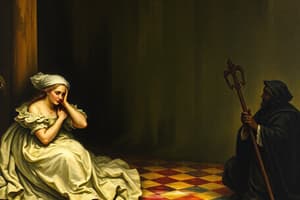Podcast
Questions and Answers
What theme is prominently portrayed in Act 3 of Shakespeare's Macbeth?
What theme is prominently portrayed in Act 3 of Shakespeare's Macbeth?
- Love and Compassion
- Greed and Ambition (correct)
- Simplicity and Humility
- Friendship and Loyalty
How does Lady Macbeth contribute to Macbeth's descent into darkness in Act 3?
How does Lady Macbeth contribute to Macbeth's descent into darkness in Act 3?
- By warning him about the consequences
- By urging him to seek redemption
- By pushing him to commit heinous acts (correct)
- By supporting his redemption journey
What character trait of Macbeth is emphasized as he progresses through Act 3?
What character trait of Macbeth is emphasized as he progresses through Act 3?
- Cowardice
- Kindness
- Bravery (correct)
- Honesty
Which literary device is evident when Macbeth begins to lose his grip on reality in Act 3?
Which literary device is evident when Macbeth begins to lose his grip on reality in Act 3?
How does the appearance of Banquo's ghost contribute to the plot in Act 3?
How does the appearance of Banquo's ghost contribute to the plot in Act 3?
Which theme is most relevant to the tragic events and self-destruction in Act 3 of Macbeth?
Which theme is most relevant to the tragic events and self-destruction in Act 3 of Macbeth?
What does the ghost of Banquo symbolize in Macbeth?
What does the ghost of Banquo symbolize in Macbeth?
How does Lady Macbeth's sleepwalking scene contribute to the play?
How does Lady Macbeth's sleepwalking scene contribute to the play?
In Macbeth, what do the witches symbolize?
In Macbeth, what do the witches symbolize?
Which literary device does Shakespeare use in Act 3 to hint at future events?
Which literary device does Shakespeare use in Act 3 to hint at future events?
What does Duncan's death in Act 3 set off in Macbeth?
What does Duncan's death in Act 3 set off in Macbeth?
How does the murder of Banquo affect the plot development in Macbeth?
How does the murder of Banquo affect the plot development in Macbeth?
Flashcards are hidden until you start studying
Study Notes
Shakespeare's Act 3: A Deeper Look
In the world of William Shakespeare's play Macbeth, Act 3 is a pivotal moment, brimming with intense emotions, revelations, and tragic twists that propel the narrative forward. Let's delve into the themes, characters, plot developments, symbolism, and literary devices that make this act a captivating part of the play.
Themes
Greed and Ambition: The greed and sheer ambition for power drive Macbeth to commit heinous acts. His loyal wife, Lady Macbeth, egg him on to achieve his goal, underscoring the theme of personal gain above all else.
Redemption: The appearance of the ghost of Banquo and the subsequent guilt Macbeth feels upon seeing him foreshadow a possible path to redemption. Macbeth's desire to rid himself of the specter drives him to seek out a witch who might be able to lift the curse.
Tragedy and Self-Destruction: The events of Act 3 showcase the depth of the characters' self-destruction. Macbeth's growing paranoia leads him to commit more crimes, ultimately driving him to an irreversible downward spiral.
Characters
Macbeth: Shakespeare portrays Macbeth as someone who is initially brave, but his ambition and the influence of his wife push him to commit heinous acts. At the beginning of Act 3, he is still in control, but as the act progresses, he loses more and more of his grip on reality.
Lady Macbeth: Her ambitious drive and unwavering support of her husband push Macbeth to commit crimes. She fears that Macbeth's guilt will consume him, and she is determined to keep his ambition alive.
Duncan: As the King of Scotland, Duncan's death at the hands of Macbeth sets off a chain of events that ultimately lead to his downfall. Although Duncan is a relatively minor character in the play, his death in Act 3 sets off a series of tragic events.
Plot Development
The Murder of Banquo: In Act 3, Macbeth orders the murder of Banquo, who is a threat to his position as king. This action pushes the plot in a more violent and sinister direction, leading Macbeth further down the path of destruction.
The Apparitions: Macbeth encounters three apparitions, who promise him that he will become King of Scotland and remain so as long as no man born of a woman shall harm him. This scene sets off a chain of events that leads to Macbeth's downfall.
Lady Macbeth's Death: Already mentally unstable, Lady Macbeth's guilt over her role in the crimes she and her husband have committed leads her to take her own life before the end of Act 3.
Symbolism
The Witches: The witches, who appear throughout the play, represent chaos and the unpredictability of fate. They are harbingers of doom and their prophecies set off a series of tragic events.
The Ghost of Banquo: The ghost of Banquo represents Macbeth's guilt and torment. It haunts him throughout Act 3, and its appearance leads Macbeth to seek out a witch who might be able to lift the curse.
Lady Macbeth's Sleepwalking Scene: This scene, which occurs in Act 3, symbolizes her mental collapse and guilt over the crimes she and her husband have committed.
Literary Devices
Foreshadowing: Throughout Act 3, Shakespeare uses foreshadowing to hint at future events. For example, the ghost of Banquo foreshadows Macbeth's downfall, while Lady Macbeth's sleepwalking scene foreshadows her mental collapse.
Symbolism: As mentioned earlier, Shakespeare uses symbolism throughout Macbeth to illustrate complex themes and character traits. In Act 3, the witches, the ghost of Banquo, and Lady Macbeth's sleepwalking scene are all examples of symbolism.
Imagery: Shakespeare's vivid use of imagery in Act 3 brings the play to life. For example, the ghost of Banquo's appearance, the witches' cries, and Lady Macbeth's sleepwalking scene all create a sense of unease and dread.
As we delve deeper into Shakespeare's Act 3, we can see the complexity and depth of the play, and how the themes, characters, plot developments, symbolism, and literary devices all come together to create a captivating and tragic story.
Studying That Suits You
Use AI to generate personalized quizzes and flashcards to suit your learning preferences.




